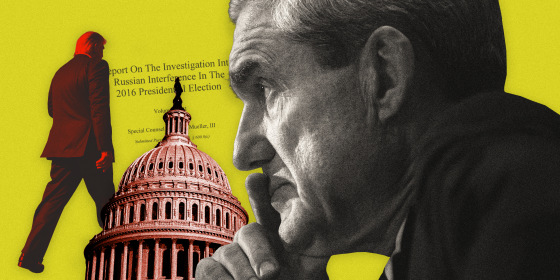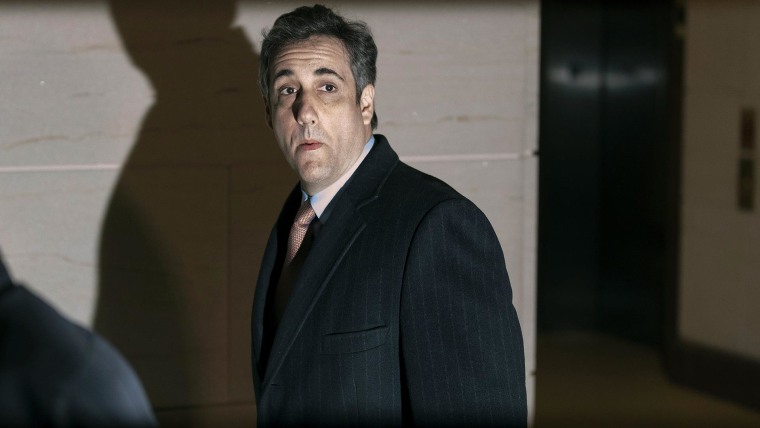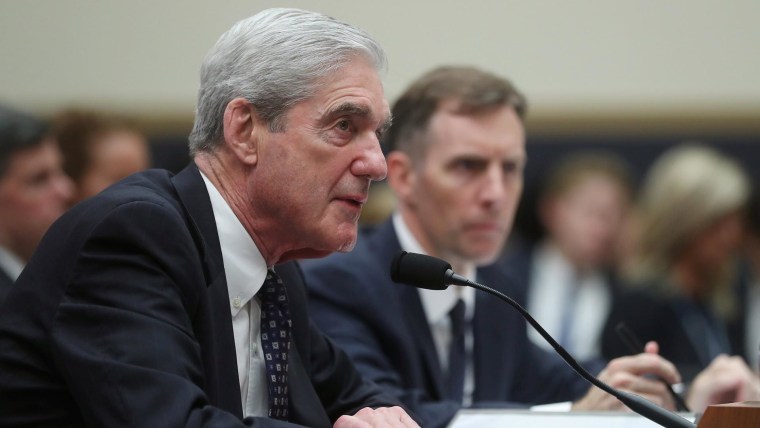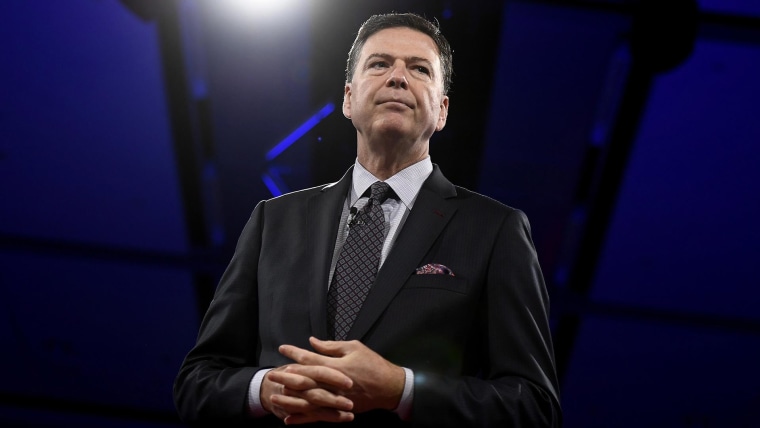Former special counsel Robert Mueller testified Wednesday before the House Judiciary and Intelligence committees about his investigation into Russian interference in the presidential election.
NBC News fact checked various claims and statements made by Mueller, members of Congress and the president. See all the claims, and the facts, below.
Did Democrats collude with Russia, as Nunes claimed?
"There is collusion in plain sight. Collusion between Russia and the Democratic Party. The Democrats colluded with Russian sources to develop the Steele dossier," Rep. Devin Nunes, R-Calif., alleged during his opening statement.
There's no evidence that the Democratic Party colluded with the foreign adversary that, according to the conclusions of the intelligence community and the results of Mueller's investigation, was working to elect their political opponent. And while inquiries into the origins of the Russia investigation are ongoing within the Department of Justice, there is no publicly available evidence of the kind of extensive conspiracy Nunes is alleging.
Hillary Clinton's campaign and the Democratic National Committee, through a lawyer, did foot the bill for Washington-based research firm Fusion GPS to probe then-candidate Trump and his ties to Russia. Fusion GPS hired Christopher Steele, a British ex-spy and Russia expert, to do the work, and Steele ultimately penned an explosive report — the "dossier" — that included unverified claims that the Russian government was working with Trump and that the president was filmed with prostitutes in Moscow.
(Clinton has said she did not know of Steele's efforts, and her campaign has pointed out that the practice of gathering opposition research on rival political candidates is routine.)
But the FBI also used Steele as a paid informant for an unknown period of time. While the FBI noted in official proceedings that Steele was initially hired by political opponents, they also said they viewed him as credible.
Politico, citing two sources familiar with the Justice Department probes, reported earlier this month that Steele was interviewed by the DOJ internal watchdog in June.
Nunes' office did not immediately respond to a request for additional information. Mueller, for his part, repeatedly declined to answer any questions about Steele or the dossier. "These matters are the subject of ongoing review by the Department," Mueller told the House Judiciary Committee.
Castro says Trump, his associates 'lied' about business dealings with Russia. Did they?
This claim, made by Rep. Joaquin Castro, D-Texas, is accurate.
Trump pursued a "highly lucrative” Trump Tower project in Moscow while running for president, according to the Mueller report. Trump signed a letter of intent on the project in November 2015 — six months after he announced his presidential bid — and efforts to build the tower continued through “at least” June 2016, according to the report. Trump even considered travel to Russia during this time, according to Mueller’s report.
But in July 2016, Trump denied having any investments in Russia. In January 2017, before he was sworn in, he told reporters, "I have no deals that could happen in Russia, because we've stayed away."
Trump's longtime personal attorney and fixer, Michael Cohen, led negotiations for the Moscow project. Cohen, who held the title of vice president at the Trump Organization, pleaded guilty to lying about the timeline of the project to Congress in 2017. In February 2019, testifying publicly on the Hill about his former boss’s misdeeds before heading to prison, Cohen alleged Trump had wanted Congress to receive misleading testimony about his ties to Russia.
"Mr. Trump had made clear to me, through his personal statements to me that we both knew were false and through his lies to the country, that he wanted me to lie,” Cohen told House lawmakers. “And he made it clear to me because his personal attorneys reviewed my statement before I gave it to Congress.”
Did Trump allies destroy documents and use encrypted apps?
House Intel Chairman Adam Schiff, D-Calif., made this allegation in his opening statement, and it's accurate, according to the special counsel's office.
"Constrained by uncooperative witnesses, the destruction of documents and the use of encrypted communications, your team was not able to establish each of the elements of the crime of conspiracy beyond a reasonable doubt, so not a provable crime, in any event," Schiff said.
Here's what the report said: "[S]ome of the individuals we interviewed or whose conduct we investigated — including some associated with the Trump campaign — deleted relevant communications or communicated during the relevant period using applications that feature encryption or do not provide for long term retention of data or communication records. In such cases, the Office was not able to corroborate witness statements through comparison to contemporaneous communications or fully question witnesses about statements that appeared inconsistent with known facts."
Trump says there was 'NO OBSTRUCTION' of Mueller's investigation. Is that true?
Trump claimed on Wednesday that an unimpeded investigation could not have been obstructed, pointing to a Fox News contributor's analysis. It's unclear exactly what point in Mueller's testimony the contributor is referring to here, but Mueller did indeed say Wednesday that his investigation was not "stopped or hindered."
But Mueller being allowed to finish his investigation isn't the same thing as reaching a conclusion of "NO OBSTRUCTION."
The former special counsel declined to come to a conclusion on whether or not the president obstructed justice — citing DOJ policy not to indict a sitting president. His report does detail the president's attempts to muddy the investigation, including efforts to tamper with witnesses and fire the special counsel. Attorney General William Barr, after receiving Mueller's report, cleared Trump of obstruction of justice.
On Wednesday, pointing to the criminal statute, Mueller told Rep. Ted Lieu, D-Calif., that an unsuccessful attempt to obstruct justice would still be a crime.
GOP rep says Trump 'cooperated fully' with Mueller's investigation. Did he?
This claim, made by Rep. Mike Johnson, R-La., is false.
"President Trump cooperated fully with the investigation, he knew he had done nothing wrong," Johnson said, wrapping up questioning for GOP members on the Judiciary Committee.
The president refused to sit for an interview with the special counsel’s office, agreeing only to answer written questions about Russian interference and possible coordination with his presidential campaign. He refused to answer questions about obstruction of justice, notably, and took a number of actions intended to disrupt, control and limit the investigation, according to Mueller’s report.
“The president’s efforts to influence the investigation were mostly unsuccessful, but that is largely because the persons who surrounded the president declined to carry out orders or accede to his requests,” the report adds.
Did Mueller interview for the FBI director job?
Mueller was interrogated by Rep. Greg Steube, R-Fla., about a conversation he had with the president the day before he was appointed special counsel: Was it a job interview? The president has repeatedly said that Mueller "interviewed" for the job and was turned down, claiming this created a conflict of interest to his appointment as special counsel.
But Mueller said it wasn't a job interview.
“My understanding is I was not applying for the job, I was asked to give my input on what it would take to do the job which triggered the interview you were talking about,” Mueller told Steube. “I interviewed with the president, it was about the job, but it was not about me applying for the job.”
And Mueller's claim here is backed up by Trump's own aides, including former White House adviser Steve Bannon, who told the special counsel's office that Mueller wasn't seeking a job for himself.
"Bannon recalled that the White House had invited Mueller to speak to the President to offer a perspective on the institution of the FBI. Bannon said that, although the White House thought about beseeching Mueller to become Director again, he did not come in looking for the job,” the report reads, citing interviews with Bannon.
Did the FBI use the Steele dossier to spy on Carter Page?
Rep. Jim Jordan, R-Ohio, complained about the warrant the FBI obtained in order to scrutinize former Trump campaign aide Carter Page on Wednesday, noting that the Steele dossier was "part of the reason they were able to get a warrant."
Jordan is correct. The FBI released a redacted copy of the warrant last year, showing that Christopher Steele's dossier was at least part of the law enforcement agency's interest in Page.
Steele is a former British spy who compiled an explosive report about the president's relationship with Russia.
The FBI disclosed to the court that the information in the dossier was paid for by political opponents of candidate Trump, but said they viewed Steele as credible. Steele, released documents revealed, was a paid FBI informant for an unknown period of time.
Why did Rep. Gohmert ask Mueller about cellphones?
Rep. Louie Gohmert, R-Texas, appeared to refer to a baseless conspiracy theory during the Mueller hearings on Wednesday, asking the former special counsel about the formatting of a pair of FBI cellphones and their text messages.
"Did you ever order anybody to investigate the deletion of all of their texts off of their government phones?” Gohmert asked, meaning messages between Peter Strzok and Lisa Page, the FBI lawyer and agency attorney who had an affair and were caught texting negatively about Trump on their work phones. “Did you order an investigation into the deletion and reformatting of their government phones?”
Mueller answered no, that he had not investigated the formatting of phones, pointing instead to the findings of a Justice Department internal watchdog that did probe the matter. The watchdog found that some 19,000 messages were initially missing from FBI records due to a technical error. Those messages were later recovered.
Trump himself has accused Mueller of deleting messages between the two.
Trump claims Mueller was 'highly conflicted.' Is that the case?
In a Wednesday morning tweetstorm, the president repeated his accusation that Mueller was "highly conflicted." But the Department of Justice and Trump's own aides found this claim to be baseless.
Ahead of Mueller’s appointment as special counsel, DOJ ethics officials considered potential conflicts of interest — namely that Mueller had previously worked with a law firm that represented Trump affiliates who could be caught up in the investigation — and cleared him for service.
Mueller’s report notes that Trump complained that Mueller had disputed certain fees related to his membership at a Trump golf course in Virginia in 2011, and had interviewed for the FBI director job shortly before his appointment as special counsel. But Trump’s own White House aides — Reince Priebus, Stephen Bannon, and counsel Don McGahn — all told the special counsel’s office that they had told the president these were not true conflicts of interest.
"The President's advisors pushed back on his assertion of conflicts, telling the President they did not count as true conflicts. Bannon recalled telling the President that the purported conflicts were 'ridiculous' and that none of them was real or could come close to justifying precluding Mueller from serving as Special Counsel," the report says.





